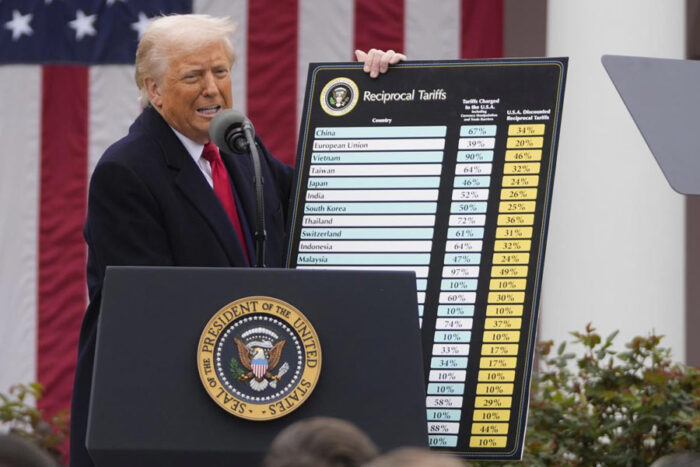
Started on August 27, 2025 , two-thirds of India’s exports to the United States – worth over $60 billion annually – are now in the tariff net. The exports to the US are now subject to 50 per cent tariffs, with the additional 25 per cent duties imposed by President Donald Trump as “penalty” for New Delhi’s Russian oil purchase.
Trump administration’s steep import duties will hit key Indian sectors such as textiles and clothing, gems and jewellery, shrimp, leather and footwear, animal products, chemicals, and electrical and mechanical machinery, sparing critical sectors like smartphones, pharmaceuticals, and energy.
The US is the largest buyer of Indian gems and jewellery, accounting for nearly 30 per cent of the sector’s global sales. With $10 billion – roughly ₹87,600 cr – in exports last year alone, this sector is staring at serious disruption due to Trump’s tariffs. Surat, the global hub for diamond polishing, is already feeling the heat with US orders slowing sharply, a Reuters report mentioned. Fear of mass unemployment looms large in states with mass production. Though small exporters are left with few options, while larger players are exploring shifting operations to countries with lower US tariffs like Botswana, which faces only 15 per cent duty, as per the report.
As for the Shrimp and seafood, India exported $2.6 billion (₹22,800 cr) worth of seafood to the US last year, according to data mentioned in the Reuters report, which added that shrimp made up 40 per cent of that. Major US clients reportedly include Walmart and Kroger. Exporters say new tariffs have led to a pause in orders, and some shrimp farmers are considering quitting the trade altogether.
For the Textiles and apparel, India exported over $2 billion in textiles and garments to the US in 2024, with $1 billion more in the first half of 2025. Major apparel and textile exporters include Shahi Exports, Welspun, Indo Count Industries, Trident and Gokaldas Exports. The major clients include Walmart, Target, Costco and Gap.
Known for their reaglity the Carpet industry is worried. India’s exports to the US in FY 2025 were $1.2 billion, with Washington having a 58.6 per cent share in Indian carpet exports. Tariffs climb from 2.9 per cent to 52.9 per cent, threatening artisanal livelihoods in Bhadohi, Mirzapur, and Srinagar, while Turkey, Pakistan, Nepal, and China gain.
Similarly, India’s Handicraft exports to the US in FY 2025 were $1.6 billion, with Washington having a 40 per cent share in Indian exports. This risks factory closures across Jodhpur, Jaipur, Moradabad and Saharanpur, with Vietnam, China, Turkey, and Mexico filling the gap.
Also, the US is the top export market for Indian auto components, with $6.6 billion (₹58,000 cr) worth exported in 2024. Car and small truck parts worth $3.5 billion (₹30,738 cr) will face 25 per cent tariffs. Larger vehicle components (used in trucks and farm equipment), worth another $3 billion (₹26,355 cr), are now hit with the full 50 per cent tariff. Big exporters like Bharat Forge, Sona Comstar, and Motherson are likely to feel the pinch.
Despite the tariff storm, smartphones and electronics have been spared. India exported nearly $7 billion (roughly ₹61,495 cr) worth of devices in 2024. Clearly, Pharmaceuticals have been spared strategically since the US is heavily dependent on affordable generic drugs from India. Indian drug-makers exported $3.6 billion (roughly ₹31,626 cr) worth of pharmaceuticals to the US in 2024, and $3.7 billion (roughly ₹32,505 cr) more in the first half of 2025. Major players like Dr Reddy’s, Sun Pharma, Lupin, and Aurobindo are safe, for now.
Similarly, renewable energy such as Solar cells, wind turbines, and related equipment also fall under Tariff exemptions. Exporters like Reliance, Adani’s Mundra Solar, Waaree, LM Wind Power, and Schneider Electric continue to ship to the US without disruption.
Trump’s “targeting” India in the face of tariffs for Russian oil imports is unjustified. In a statement by the Ministry of External Affairs, “It is therefore extremely unfortunate that the US should choose to impose additional tariffs on India for actions that several other countries are also taking in their own national interest.”
Though India had previously labelled Trump’s threats against it as “unjustified and unreasonable” and accused the US and European Union of unfairly targeting New Delhi for its trade with Russia. In its first countermeasure to the tariffs, India launched dedicated outreach programmes in 40 major markets, including the UK, Japan and South Korea, as its first counter to US tariffs, with a special focus on boosting textile exports. The drive will also target key destinations such as Germany, France, Italy, Spain, the Netherlands, Poland, Canada, Mexico, Russia, Belgium, Turkiye, the UAE and Australia.
“In each of these 40 markets, this is proposed to pursue a targeted approach, positioning itself as a reliable supplier of quality, sustainable, and innovative textile products with the lead role of the Indian industry, including EPCs and Indian Missions in these countries,” the EAM added.
Quite clearly, it’s a matter of pride for India to not bend with unreasonable demands. Probably it’s the global recognition of Indian economy on the rise that is fuelling in the insecurities to one of the most powerful President. But India has it’s answer to the world in the name of “Make in India”.


















